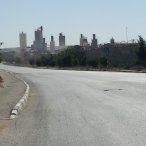
11 de octubre de 2013 | Entrevistas | Agua | Misión Solidaridad ATI en Palestina | Anti-neoliberalismo | Derechos humanos | Luchadores sociales en riesgo
Lethal Industry
Industrial Pollution and Disease in the West Bank
Descargar: MP3 (8.1 MB)
Seven Israeli industrial plants in the complex known as Geshuri in Palestine, to the north of the West Bank, have caused serious environmental pollution in the area and six workers died as a result.
The release of toxic gases and solid and liquid waste in the area penetrate the soil reaching the underground layers, thus the alarming cases of breathing diseases and cancer. This concerns environmental activists, researchers and trade unionists, among other local and national actors.
The mission of Friends of the Earth International (FoEI) in Palestine, visited the General Trade Union of Food and Agriculture Industries in the West Bank. There, the members of the Executive Committee of several countries and members of the federation’s International Secretariat (based in Amsterdam, The Netherlands), spoke with trade union leader Mohammed Blede.
The first one was a gas production plant, the second one manufactured filters for agriculture and the third one recycled plastic. The third plant closed down. He Geshuri complex, which now hosts seven plants, was torn down and rebuilt twice between 1970 to 1983, because the Israeli authorities did not allow the plant in their territory because of the level of pollution. This is why they took a shortcut: the third time the industrial complex was built on Palestinian territory and it does not have to comply with the Israeli standards, even though it hosts Israeli industries.
The workers of the plants went on general strike and managed to get a living wage. Their labour benefits do not include health checks, says the trade union leader Mohammed Blede. There are no serious studies on the large number of cases of diseases, especially cancer, in the area. The number largely exceeds the figures of incidence of the disease in other cities. In the area there are other towns, besides Tulkarem, that have also registered many cases of cancer.
The plants built after the first three manufacture fertilizers, pesticides, paint, etc. If the wind blows from the west and the pollution reaches the Palestinian side the plants operate. But if there is wind from the east, the plants close so that the Israelis do not have to put up with breathing the polluting and pestilent air we breathed today on site, and which the Palestinians of Tulkarem and surrounding areas breathe every day. In any case, the eastern wind is rather exceptional.
Now we hear part of the conversation with Blede in front of the Geshuri complex.
*This interview was originally in Arabic and it has been translated into English.
Imagen: Radio Mundo Real








